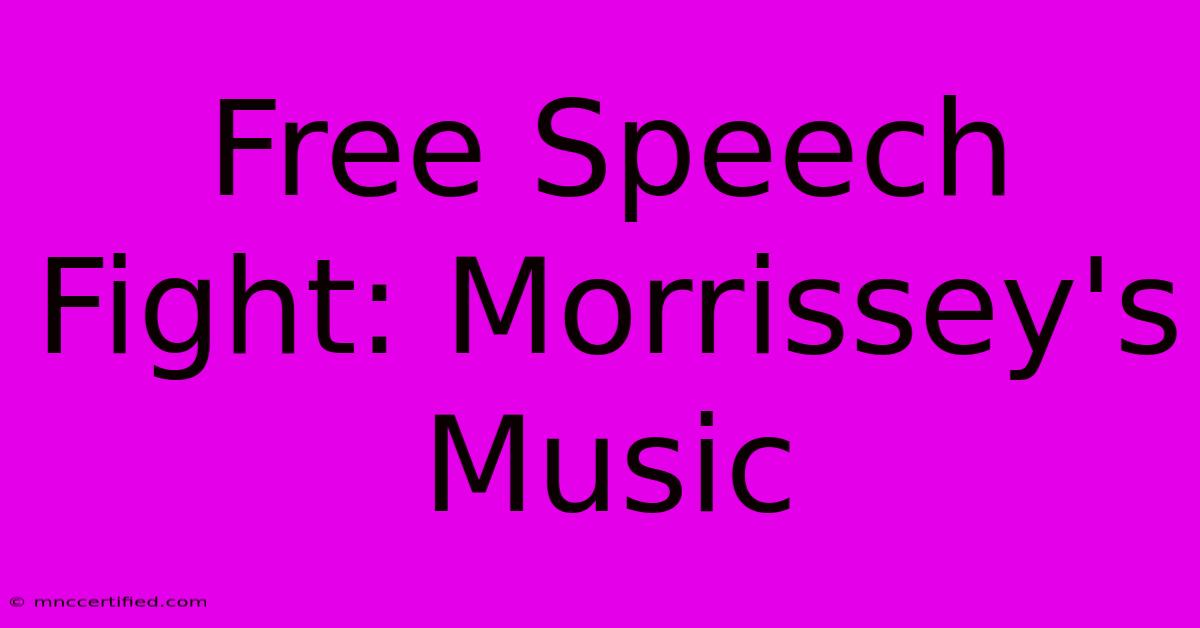Free Speech Fight: Morrissey's Music

Table of Contents
Free Speech Fight: Morrissey's Music – A Controversial Legacy
Morrissey, the enigmatic former frontman of The Smiths, remains a towering figure in music, his influence undeniable. However, his career is inextricably linked to controversy, particularly surrounding his outspoken views and their frequent clashes with prevailing notions of acceptable public discourse. This article delves into the complex relationship between Morrissey's music and the ongoing debate surrounding free speech, exploring the artist's controversial statements and their impact on his legacy.
The Artist and the Activist: A Blurred Line
Morrissey has never shied away from expressing his opinions, often on politically charged and socially sensitive issues. This outspokenness, while admired by some for its perceived authenticity, has frequently led to accusations of racism, homophobia, and transphobia. His comments, often delivered with a provocative flair, have sparked intense public backlash and boycotts, raising fundamental questions about the limits of free speech, especially for public figures with significant influence.
Controversial Statements and Their Fallout
Several instances highlight the contentious nature of Morrissey's public persona. His comments on topics ranging from immigration to the British monarchy have regularly ignited firestorms of criticism. These statements, often interpreted as insensitive or hateful, have resulted in concert cancellations, radio bans, and widespread condemnation across social media. The question remains: where does artistic expression end and harmful rhetoric begin?
The Defense of Free Speech: A Complex Argument
Supporters of Morrissey often argue that his controversial remarks fall under the umbrella of free speech, emphasizing the importance of open dialogue, even when uncomfortable. They contend that silencing dissenting voices, even those with unpopular opinions, sets a dangerous precedent. This argument, while valid in principle, often clashes with the realities of the harm caused by hate speech and the potential for such speech to incite violence or discrimination.
Analyzing the Music: Separating Art from Artist
A crucial aspect of this debate lies in separating the artistic merit of Morrissey's music from his controversial personal views. Many listeners find solace and meaning in his lyrics, appreciating his poetic skill and introspective nature. However, the shadow of his public statements inevitably looms over his artistic achievements, making it difficult for some to reconcile their enjoyment of his music with their disapproval of his rhetoric.
The Power of Music: A Double-Edged Sword
Morrissey's music has undeniably impacted countless individuals, providing a soundtrack to their lives and offering solace during difficult times. However, the power of his influence is a double-edged sword. His controversial opinions can be equally impactful, potentially legitimizing hateful ideologies in the minds of some listeners. This raises important questions about the responsibility of artists and the potential consequences of their public pronouncements.
The Ongoing Debate: Finding a Balance
The Morrissey case presents a multifaceted challenge to our understanding of free speech in the modern era. It forces us to grapple with complex questions: Where do we draw the line between expressing unpopular opinions and perpetuating harmful rhetoric? Can we separate an artist's work from their personal beliefs? What responsibility do public figures bear for the potential impact of their words?
These are not easy questions, and there are no simple answers. The ongoing debate surrounding Morrissey's legacy serves as a vital reminder of the ongoing tension between artistic freedom and social responsibility. The conversation is far from over, and its continued relevance is a testament to the power and complexity of free speech in the 21st century.
Keywords: Morrissey, free speech, controversy, music, artist, activism, hate speech, social responsibility, public figure, legacy, The Smiths, debate, opinion, censorship, artistic expression.
Off-Page SEO Strategies:
- Guest Blogging: Contribute articles on related topics (music criticism, free speech debates, celebrity controversies) to relevant websites.
- Social Media Engagement: Participate in discussions on platforms like Twitter and Facebook, using relevant hashtags (#Morrissey, #FreeSpeech, #MusicControversy).
- Forum Participation: Engage in online forums and discussions related to music and free speech.
- Backlinks: Seek backlinks from reputable websites covering music, politics, and social issues.
This comprehensive approach combines on-page SEO optimization (keyword integration, header structure, readability) with off-page strategies (link building, social media engagement) to improve search engine ranking and attract a wider audience. Remember to always present information accurately and ethically.

Thank you for visiting our website wich cover about Free Speech Fight: Morrissey's Music. We hope the information provided has been useful to you. Feel free to contact us if you have any questions or need further assistance. See you next time and dont miss to bookmark.
Featured Posts
-
Jamie Lee Komoroski Bond Hearing
Nov 21, 2024
-
Gm Retiree Life Insurance Amount
Nov 21, 2024
-
Missile Strike Russia Targets Ukraine
Nov 21, 2024
-
Strait Pays Tribute To Wife
Nov 21, 2024
-
Does Insurance Cover Cryotherapy
Nov 21, 2024